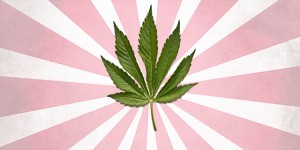 By a quirk of time, Easter, the most sacred day on the Christian calendar coincided with 4/20, the most celebrated day in the cannabis community. This convergence has me pondering marijuana’s link to spirituality, and I discovered that there are cultures other than Rastafari that use cannabis as a catalyst for their spiritual journeys, like Indian, Hindu, African, Chinese and many other cultures throughout history. The almost universal ties between cannabis and religion led me to an inescapable question: Why is marijuana not legal for religious purposes in the United States? At first glance, the answer seems simple, but the issue becomes complicated the deeper you delve into it.
By a quirk of time, Easter, the most sacred day on the Christian calendar coincided with 4/20, the most celebrated day in the cannabis community. This convergence has me pondering marijuana’s link to spirituality, and I discovered that there are cultures other than Rastafari that use cannabis as a catalyst for their spiritual journeys, like Indian, Hindu, African, Chinese and many other cultures throughout history. The almost universal ties between cannabis and religion led me to an inescapable question: Why is marijuana not legal for religious purposes in the United States? At first glance, the answer seems simple, but the issue becomes complicated the deeper you delve into it.
Let’s start with alcohol, a cornerstone in the sacraments of Hebrew, Christian and Greek communities, to name but a few. In these widely accepted practices, alcohol consumption has long been incorporated into ceremonial rites. Some sects even encourage minors to take part in these rites. And these aren’t minor religious ceremonies that are rarely practiced in “modern” society either. Communion, Shabbat, Seder and Purim are only the headliners on a list of rituals that incorporate the consumption of wine by all believers.
Let’s take it a step further and analyze one example of special dispensation given to a Schedule I drug on religious grounds. While the establishment has traditionally viewed peyote as just another means to get high, it’s well documented that Native Americans utilized the powerful hallucinogen to induce a spiritual state in their ceremonies and celebrations. For thousand of years the plant was seen as a sacrament and used to bridge the living and spiritual worlds. Sadly, this was ignored when Native Americans lost legal access to peyote with the Drug Abuse Control Amendments of 1965. Naturally, this sparked a legal battle between the people and all three branches of government, questioning the balance between the Constitution and natural rights as they applied to religious freedom.
The first attempt at a resolution was the American Indian Religious Freedom Act of 1978. This law openly recognized the “inherent right of freedom to believe, express and exercise their traditional religions” including the “freedom to worship through ceremonial and traditional rites” through peyote use. However, the issue was brought up again in 1991 when the U.S. Supreme Court denied constitutional protection for the sacramental use of peyote; a ruling that was widely criticized as a major blow to religious freedom. The matter was seemingly resolved in 1994 when Congress passed and President Clinton signed into law an amendment to the 1978 Act exempting the religious use of peyote from federal and state controlled substance laws and specifically prohibiting discrimination against its use for religious purposes.
Armed with this precedent, I returned to the Rastafari movement, as it best exemplifies marijuana’s role in a Judeo/Christian religion widely practiced today, including in America. Judeo/Christian you ask? Yup, the justification of “ganga” use in Rastafari culture stems directly from holy scripture, where it states:
“And the earth brought forth grass, and the herb yielding seed after his kind, and the tree yielding fruit, whose seed was in itself, after his kind: and God saw it was good.”
Genesis 1:12
There are many such passages in the Bible that any true believer of the Rastafari religion will gladly cite as defense of their beliefs. Not only that, but most Rastafari elders can quote the history of the herb from antiquity to the present. And contrary to popular belief, their reverence for “the holy herb” does not equate to a religion that endorses a lifestyle of lazy, forgetful potheads. Quite the contrary, as with any religious sacrament, traditional Rastafari culture promotes moderate marijuana use only, believing that any substance can have a negative effect on the body and mind if used in excess.
Perhaps this is why studies such as the one done by the National Commission on Marijuana and Drug Abuse in 1972, an in-depth research project on the effects of marijuana on the people of Jamaica, have all concluded that “no significant physical or mental abnormalities can be attributed to marijuana use” among the Rastafari people.
Yet even for religious practices, cannabis is still illegal in the United States. So what really differentiates it from alcohol or peyote when used in the name of religion? The only conclusion I can come to is that other than deeply ingrained racial or cultural prejudice, this is just another unjustifiable wrong associated with the broader prohibition of marijuana spurred on by an association with anti-establishment movements and movements that are radical in thought. This is a common misconception of the Rastafari people, those of Indian descent and even the hippie counterculture of the ’60s (though this was not a religious movement, as much as it was a spiritual awakening for the youth of America).
Does all of this mean that I’m going to convert to the Rastafarianism if marijuana use is made legal for religious purposes? No, but many others might. What’s more, I think anyone who appreciates marijuana does so in part because we recognize and enjoy the spiritual sensitivity it offers. Whether as part of a formal religion or independently, all individuals have a right to explore that spiritual enlightenment as we see fit and I’m happy to fight for our right to do so.